Key takeaways:
- Anti-war activism challenges the moral implications of conflict, highlighting the importance of every individual’s voice in promoting change.
- Finding your voice empowers both individuals and the collective, fostering a sense of belonging and encouraging dialogue within the movement.
- Effective protest participation involves clear messaging, building alliances, and prioritizing self-care to sustain long-term activism efforts.
- Engaging with the community creates trust, fosters compassion, and transforms individual voices into a united front for change.
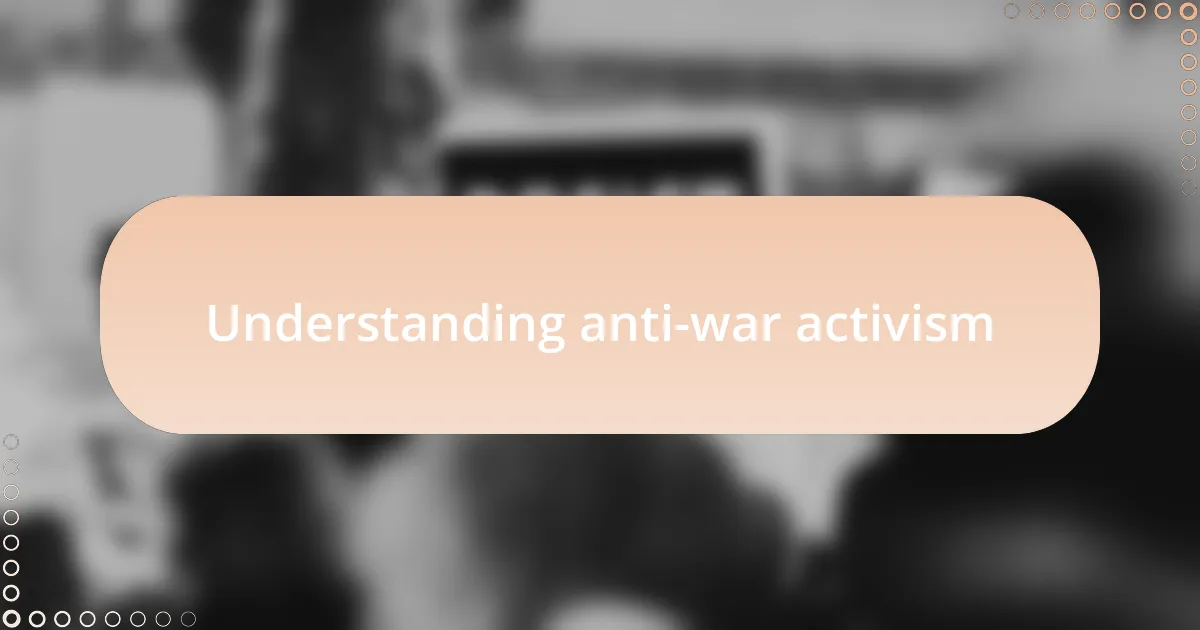
Understanding anti-war activism
Anti-war activism is fundamentally about challenging the impact of conflict on humanity. I remember attending a vigil for civilians affected by war, feeling a profound sense of connection with the individuals whose lives had been shattered. It made me wonder: how is it possible to stand silent in the face of such suffering?
At its core, anti-war activism raises critical questions about morality, justice, and the value of life. When I first began my journey, I grappled with the notion of power—how those in authority often prioritize political agendas over human rights. Have you ever felt a push to speak out against something that felt fundamentally wrong? That inner conflict can be a powerful catalyst for action.
Understanding this movement means recognizing the diverse voices that contribute to it. I often reflect on a conversation with an elder activist who shared his experiences of protesting during the Vietnam War. His stories of hope and resilience ignited a fire within me, reminding me that each voice matters, and when we speak together, we can create meaningful change.
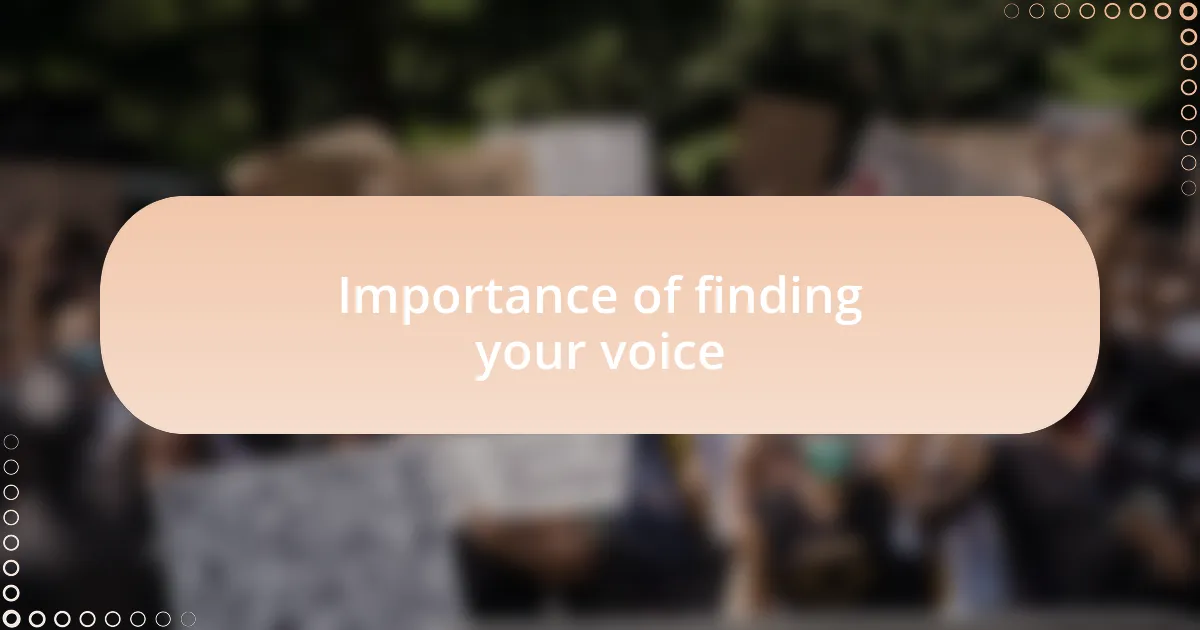
Importance of finding your voice
Finding your voice is crucial in any movement, especially in anti-war activism. I still recall the moment I took the stage at my first protest, my heart racing and my palms sweaty. Why was it so daunting to express my thoughts publicly? Yet, that fear transformed into empowerment as I shared my feelings about the conflicts I had witnessed. It was a revelation; when you speak out, you not only assert your beliefs but also encourage others to find their own voice.
The weight of silence can be heavy, and I learned this firsthand during a protest where we all seemed to be shouting the same message but in different languages. It struck me that each unique perspective was equally important, adding depth to our collective struggle. Have you ever felt that surge of strength when someone else articulates what you’ve been silently feeling? Such moments remind us that our voices, no matter how small, contribute to a chorus against injustice.
Moreover, finding your voice fosters a sense of belonging within the movement. I remember feeling isolated until I connected with others who shared my concerns and passions. This sense of community encouraged me to express my thoughts more openly. It solidified my belief that finding my voice was not just about me; it was about creating a dialogue that could inspire others to join us. How can we move forward together if we remain mute? Encouraging one another to speak up transforms individual experiences into a collective strength.
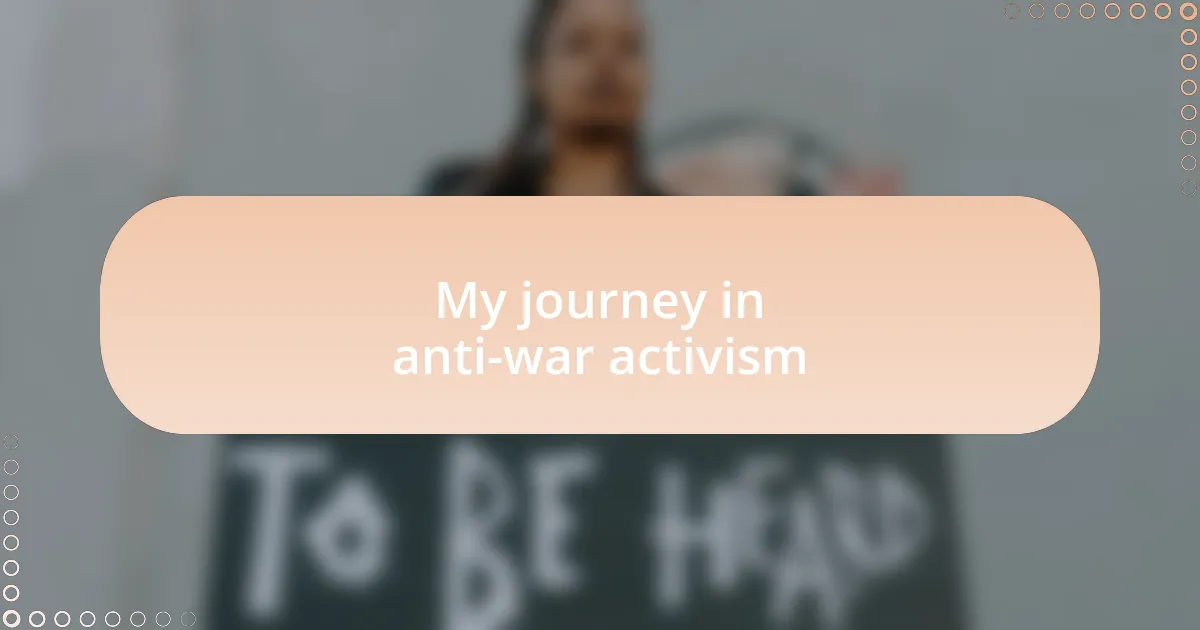
My journey in anti-war activism
As I began my journey in anti-war activism, it felt like stepping into a whirlwind of emotions and contradictions. I vividly remember attending my first local meeting, surrounded by passionate individuals who shared their stories of loss and hope. Listening to them, I realized that every voice carries a weight; every narrative has the power to challenge the status quo. Isn’t it fascinating how a shared sense of purpose can turn strangers into allies?
Over time, my activism shifted from passive participation to taking on a leadership role. I still recall organizing a vigil for victims of war; the faces in the crowd mirrored my own sorrow and rage. It was a transformative moment when I understood that organizing and speaking out gave me strength, not just to advocate for peace but to heal in the process. Have you ever felt that rush of connection when standing shoulder to shoulder with others united for a cause?
Each step in my activism journey tested my resolve. In navigating the complexities of protests—chanting slogans, writing speeches, and negotiating with authorities—I often questioned my capability. But with every setback, I found a deeper understanding of my voice. It became clear that activism isn’t just about raising awareness; it’s about embracing vulnerability and using it to fuel collective action. How can we not speak out when we see so much suffering? Finding my voice was not just personal; it was my invitation for others to join in this vital conversation.
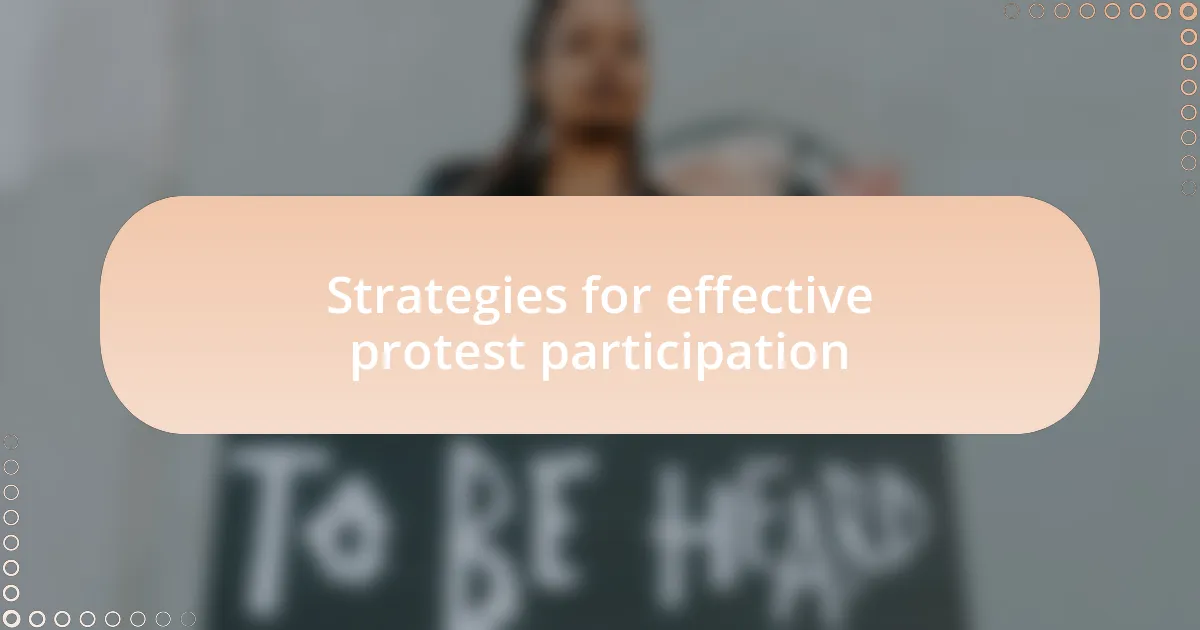
Strategies for effective protest participation
Participating effectively in protests requires a clear understanding of your message. I remember my first large demonstration, where I was so overwhelmed by the crowd that I lost sight of why I was there. By taking the time to articulate my thoughts and crafting a message that resonated with others, I found my purpose shining through the noise. How could I share my feelings without losing my voice in the collective effort?
Another strategy I discovered is the importance of building alliances. I’ve had friendships blossom over late-night discussions about tactics or shared meals before a march. These connections not only enhance the experience but also strengthen our collective impact. When we join forces, our diverse perspectives create a mosaic of voices, amplifying the message far beyond its singular note. Have you ever felt that newfound power in unity when standing shoulder to shoulder with fellow advocates?
Lastly, remember to nurture self-care amid activism. I once pushed myself to the limits, thinking that relentless dedication to the cause was the only way to make an impact. However, I learned the hard way that taking time to recharge not only benefits my well-being but enhances my effectiveness on the front lines. Have you found moments to pause and reflect for your own growth in this movement? Balancing passion with self-care is crucial, ensuring that our voices remain strong and clear for the battles ahead.
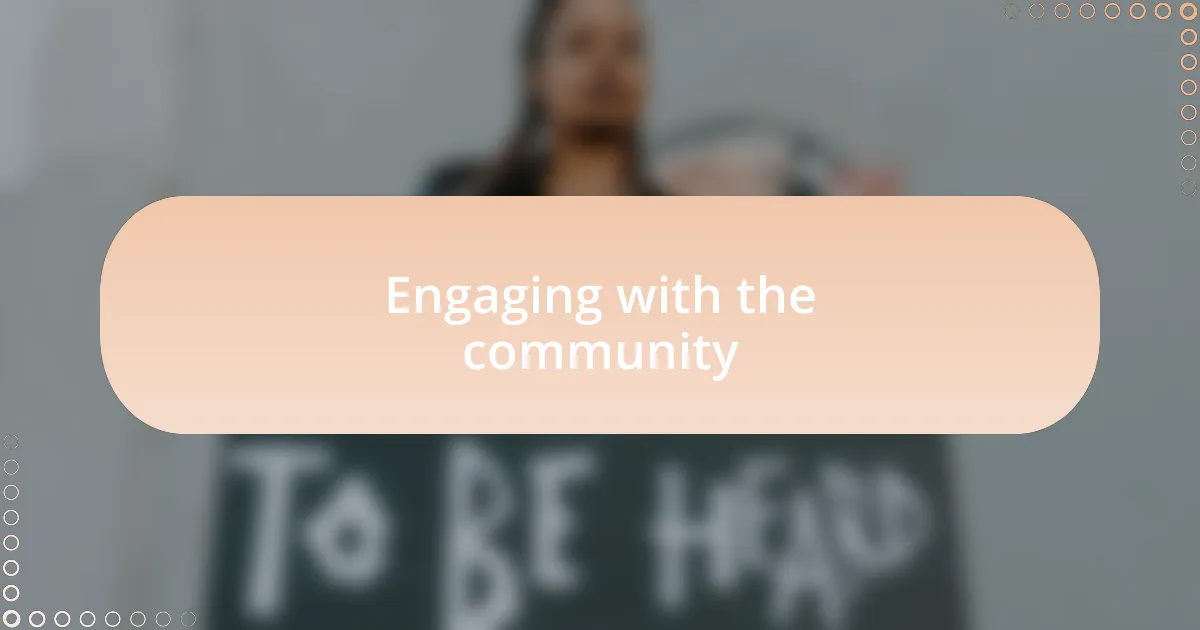
Engaging with the community
Engaging with the community is an essential part of any activism journey. I vividly recall a moment at a local organizing meeting, where we opened the floor for everyone to share their experiences. It was incredible to see how many voices came together, each person adding their unique story. How often do we listen to each other in a world full of noise? It struck me that fostering this dialogue not only builds trust but strengthens our resolve.
As I started attending more neighborhood gatherings, I noticed a shift within myself. I began viewing people not just as fellow activists but as friends and allies. One day, while discussing ways to raise awareness, an idea sparked from a simple suggestion: a community mural that expressed our shared vision for peace. Hasn’t art always been a powerful tool for connection? This project became more than just a visual representation; it united us in our fight, creating a space for collaboration and creativity.
Compassion also plays a vital role in community engagement. A particular instance stands out when a fellow activist openly shared their struggle with mental health during a discussion. It reminded us all that we are not only fighting against war but also addressing the emotional toll it takes on individuals. How can we be strong advocates if we neglect our own well-being and that of others? This experience illuminated the importance of empathy in building a supportive network, reinforcing that we are in this together, every step of the way.